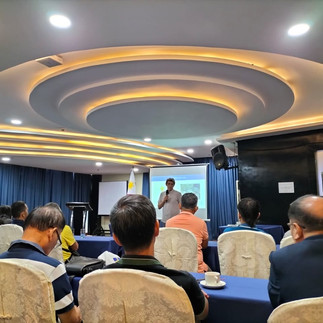Brief report on the ISSF Skippers Workshop in General Santos, Greenleaf Hotel
- FIA-PNG
- Aug 14, 2024
- 2 min read
Updated: Aug 14, 2024

The ISSF Skippers workshop was held at the Greenleaf Hotel in General Santos on Friday, August 9, 2024. It was attended by representatives from members of the Fishing Industry Association (PNG) Inc and the government of Papua New Guinea through the National Fisheries Authority. Participants included representatives from TSP, Trans Pacific Journey (TPJ), Frabelle, RD Fishing Group, Starcki Venture Corporation, Nambawan Seafoods, Bluecatch, Coastal Shipping Agent, NFA, and FIA PNG. A total of thirty-four participants attended the workshop.
The workshop was facilitated by ISSF Dr Jefferson Murua who informed and provided scientific information and awareness on best practices towards Eco-certification schemes. ISSF objectives were also aligned with the Marine Stewardship Council (MSC) standard certification, considered the most Credible Eco-certification currently around the world, and the most credible and respected scheme that showed sustainable sourcing in the tuna fisheries.
Due to IUU and unsustainable fishing practices in most of the world’s oceans, a global effort is now needed to address the impacts of FAD-caught tuna. For example, in the Indian Ocean studies have shown that there is not much free school fishing now because of the impact of FADs. This resulted in what is known as the ‘Ecological Trap’ that doesn’t allow a free school in the Indian Ocean. In addition, most purse seine tuna fisheries in the WCPO work with FADs that raised grave concerns about reducing the impacts of these man-made structures in the marine ecosystems. Significant efforts are now required to minimize these impacts.
The main impacts of purse seine working with FAD fishery included; FAD Marine Pollution, Mitigate Bycatch of Endangered species (release devices) and Reducing the catch of juvenile skip jack and yellowfin tuna with the use of acoustic echosounders.
Discussions during the workshop included zero mesh tolerance in FAD materials and constructions, biodegradable FADs using organic materials and reducing the impacts of ghost fishing and marine pollution.
The key outcomes of the skipper’s workshop were as follows:
Fishing retailers and markets will prioritize vessels showing sustainable fishing practices
Developing ways to avoid bycatch and new tools like ramps and grids can increase survival
In several oceans mesh in FADs is prohibited and in 2025 the rest will follow.
Marine pollution should be minimised by using biodegradable materials and designs like Jelly FADs
Juvenile tuna impacts should be reduced to ensure healthy productive stocks for future fishing
MSC Audits are looking at all these mitigation actions in their evaluation
The workshop concluded with acknowledgements from ISSF to all who had attended and especially to the sponsor of the workshop TSP and FIA PNG. Certificate of attendance will be given to all who participated in the ISSF Skippers workshop.
Prepared by:
Ms. Nialangis Posanau
Sustainability & MSC Coordinator



















Comments